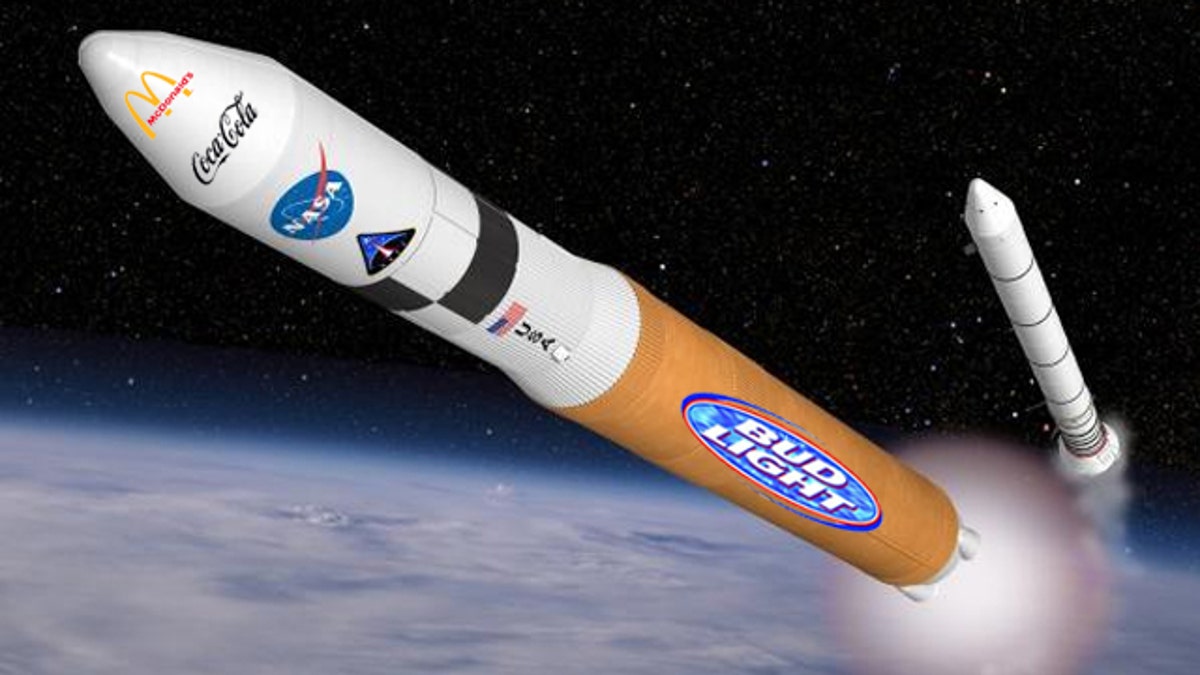
Corporate sponsorships may be the key funding boost for a mission to Mars, researchers say. (NASA/FoxNews.com graphic)
Welcome to the manned mission to Mars -- brought to you with limited interruptions by Bud Light.
It's not so crazy, actually: One of the biggest obstacle to a potential space mission is finding the almost $150 billion dollars needed to develop the program. And tagging a future spaceship with the word “Drinkability” may seem ridiculous, but it's exactly what Rhawn Joseph has proposed in the latest issue of the Journal of Cosmology.
“With clever marketing and advertising and the subsequent increase in public interest, between $30 billion to $90 billion can be raised through corporate sponsorships, and an additional $1 billion a year through individual sponsorships,” wrote Joseph, a scientist with the Brain Research Laboratory in California.
Just as Tang became associated in the public's eye with space travel in the 70s and 80s, Joseph suggests selling the naming rights to Mars landing craft, the Mars Colony, the spaceship itself and more. Television broadcasting rights alone would bring in $30 billion, and that doesn't include the sale of real estate and mineral rights on Mars.
“Other than paying for one of the greatest achievements of all time and the technological revolution that would result, is it worth $145 billion in expenditures, over a 10-year period, to conquer an entire planet and to lay claim to the vast wealth which may lay beneath the surface?” he wonders rhetorically.
Two straight years of intense worldwide scrutiny seems like the opportunity of a lifetime, yet the dozen or so companies FoxNews.com contacted were hesitant to speculate about their potential involvement.
A Greyhound spokesman admitted that the company would consider the idea if it were mutually beneficial when the time comes -- but for now, it's simply too early to say. AT&T spokesman Mark Siegel echoed these sentiments, noting that the "biggest and most important challenge is serving our customers here on Earth."
Microsoft had no comment, and other companies such as Amtrak, Facebook, Google, Apple, Verizon Wireless, and Tesla Motors either declined to commit or did not immediately respond. But there's a big difference between naming Wrigley Field and branding a spaceship, explained Brian Collins, the former chief creative officer of the branding division within Ogilvy & Mather and now the creative director and designer of private firm Collins. What happens if something goes wrong?
"People aren’t harnessing baseball players to explosives to send them to another planet,” he joked. The risk is serious, though, Collins notes, and a possible reason for hesitation among businesses. Sure, the connection to space travel has positive connotations, but it's also a risk.
“What kind of brand would be enhanced by endorsing this kind of a journey? Brands about discovery, exploration, courage, and risk-taking would be the best fit," Collins told FoxNews.com. “Brands willing to embrace the adventure. But you always have to frame it against, ‘what happens if something goes wrong?’”
YOU DECIDE: Would you be OK with: "This journey to Mars brought to you by Bud Light"?
Even without immediate corporate commitments, Joseph sees a wealth of possibilities, modeled after professional sports, specifically the U.K. soccer group UEFA Champions League, whose final in May of 2009 between Barcelona and Manchester United drew an audience of 109 million -- three million more than last year's Super Bowl.
Making sure to cover all of his demographic bases, Joseph even discusses the merits of reality television. “What could be more "real" than a human mission to Mars, where astronaut heroes must overcome a grueling, competitive ordeal, with the "survivors" winning the right to face death while taking part in the ultimate adventure of all time,” Joseph asks.
Collins believes that in addition to the inspiration to the nation astronaut heroes present, the advertisers could be a force for inspiration too -- assuming the right type of person put the force of their will behind the mission.
“It needs someone with a real voice, not just a brand. Someone who has a public presence. Steve Jobs with Apple, Larry Ellison with Oracle, Richard Branson with Virgin. Or Jeff Bezos of Amazon.com,” he suggested.
"Someone like that who’s willing to recognize the risk and also the reward, and would be able to be the voice of the brand to the world as the journey unfolds.”
A manned trip to Mars would command the attention of the entire world and perhaps re-ignite mainstream interest in space and science -- something we need, Collins thinks. He believes NASA could use an advertiser's help in selling the mission -- and the astronauts themselves.
"Now when they take a picture of people coming back on the shuttle, they're dressed in double-pleated chinos. They don’t look like astronauts, they look like orthodontists," Collins told FoxNews.com.
"The sense that they doing something exciting and dangerous in space is lost. They don’t look like they’re rocketing into outer space, they look like they’re walking to the next tee,” he said.








































